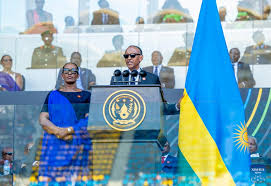Africa
Paul Kagame’s Inauguration: Renews Oath as Rwanda’s Leader

Paul Kagame has renewed his oath of loyalty during his inauguration as Rwanda’s leader, reaffirming his commitment to the nation and his role in guiding the country forward.
Rwanda’s future lies at a crucial juncture with Paul Kagame beginning another term. His admirers praise the progress made under his guidance, however, the global community is wary of mounting apprehensions concerning individual rights and an excessive grasp on authority by one person.
The ceremony held in Kigali carried significant weight beyond being a mere formality. It served as a compelling testament to Kagame’s unwavering impact and the intricate heritage he is establishing within Rwanda.
On Sunday, Kagame was inaugurated in a grand ceremony held in the capital city of Kigali after being re-elected as Rwanda’s president. The 66-year-old leader who has been at the helm since post-Rwandan genocide era took an oath to remain loyal and pledged his commitment to lead the nation while faithfully adhering to its constitution and laws. “As Kagame Paul, I solemnly swear my unwavering loyalty to Rwanda that I will fulfill all responsibilities entrusted upon me with diligence,” he declared during his inauguration speech.
With his unopposed election behind him, Kagame’s inauguration signals another term in office. Despite criticisms from international observers and human rights groups, he retains a strong hold on power. Those who directly oppose him have been silenced; even two of his potential rivals were denied the chance to run for high-level positions.
Initially gaining recognition as the commander of the rebel troops that terminated the mass killing of nearly 800,000 Rwandans in 1994, Kagame ascended to become Rwanda’s unofficial head and took up presidential duties in 2000. During his tenure at the helm, he has overseen remarkable economic expansion while maintaining stability within Rwanda. These accomplishments have earned him commendation from some quarters for propelling progress forward.
Rwandans were given the opportunity to vote on lifting presidential term limits through a referendum held in 2015. The outcome was hugely in favor of the change, which could now allow Kagame’s presidency to extend as far as 2034. This decision has resulted in discussions contemplating Rwanda’s democratic future; concerns have been raised about both the impartiality of the electoral process and its implications for overall governance within their society.
